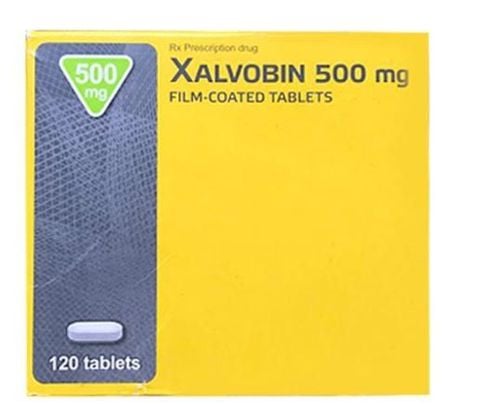This is an automatically translated article.
Citabin medicine contains the active ingredient Capecitabine 500mg and other excipients in sufficient quantity. This is a drug that treats cancer and affects the immune system.
1. What is Citabine?
Citabin medicine contains the active ingredient Capecitabine 500mg and other excipients in sufficient quantity. Citabine is a cancer treatment drug that affects the immune system.
Citabin is prepared in the form of film-coated tablets, suitable for direct oral use. Packing is a box of 1 blister, each blister contains 10 tablets.
2. What effect does Citabine have?
Citabine is used alone or in combination with other cancer treatments. Medicines that slow or stop the growth of cancer cells and reduce tumor size. Treatment of breast cancer: Citabine is used in the treatment of locally advanced or metastatic breast cancer after the failure of chemotherapy. Treatment of colorectal cancer: this drug is indicated for adjuvant treatment for people with colon cancer after surgery, metastatic colorectal cancer Treatment for stomach cancer: The drug contains the active ingredient Capecitabine is The fluoropyrimidine carbamate derivative is selectively toxic to tumor cells.
3. Usage and dosage of Citabine
3.1. Dosage of the drug Citabin Single treatment: The dose used to treat colorectal cancer, breast cancer is 1250mg/m2, twice a day x 14 days. Then 7 days off drug
Combination therapy:
Initial dose for breast cancer treatment is 1250 mg/m2, 2 times/day x 2 weeks, in combination with Docetaxel, then 1 week off Treatment dose stomach, colorectal cancer: 800-1000 mg/m2/time x 2 times/day x 2 weeks, then 7 days off drug or 625 mg/m2/time x 2 times/day for continuous treatment. 3.2. How to use the drug You should use Citabin with food: Drink with water within 30 minutes after eating.
4. Undesirable effects of the drug Citabine
During the use of Citabin, users may experience some undesirable effects as follows:
Nausea and vomiting may develop seriously when using the drug. In some cases, your doctor may prescribe medication to prevent or reduce nausea and vomiting. Eating several small meals, not eating before treatment, or limiting your participation in activities may help reduce some of these effects. If any of these reactions occur or get worse, you should promptly inform your treating doctor or pharmacist. Diarrhea is a common side effect of this medication. Drink plenty of fluids unless otherwise directed. Your doctor may also prescribe specific medications such as Loperamide to help relieve diarrhea. Temporary hair loss may occur, and normal hair growth or hair growth will return once treatment has ended. In addition, temporary nail changes may occur. People who use Citabine may have serious unwanted effects. However, your treating doctor has prescribed this medicine, because they have judged that your benefits outweigh the risk of side effects. Careful monitoring of your health status by your doctor can reduce the possible risks. For men and women of childbearing age, Citabine may negatively affect your ability to have children. You need to consult your treating doctor for more details. Citabine may decrease the body's ability to fight infections. This can put you at risk for a serious (rarely fatal) infection or make any infection worse. You should tell your treating doctor right away if you have any signs of infection such as a sore throat that doesn't go away, fever, chills, cough. Very serious allergic reactions to this medicine are very rare. However, you should contact your doctor right away if you notice signs of a serious allergic reaction such as rash, itching or swelling of the face, gums, tongue or throat, or severe dizziness. accompanied by shortness of breath. The above is not a complete list of undesirable effects that may occur when using this medicine. If you notice other side effects not listed above, you should contact your treating doctor or pharmacist.
5. Citabine drug interactions
Citabine causes serious interactions with some of the following drugs:
Coumarin anticoagulants: People taking coumarin derivatives with capecitabine should be carefully monitored for changes in coagulation parameters. and the anticoagulant dose must be adjusted accordingly. Phenytoin: Increased plasma concentrations of phenytoin have been observed during co-administration of Citabine with Phenytoin. People taking Phenytoin together with Citabine should be carefully monitored because of increased plasma concentrations of Phenytoin. Oxaliplatin: No clinically significant differences in exposure to Citabine or its metabolites, free platinum or total platinum occurred when Citabine and Oxaliplatin were used in combination therapy, with or without Bevacizumab. Antacids: The effects of aluminum hydroxide and magnesium hydroxide-containing antacids on the pharmacokinetics of the active ingredient capecitabine contained in citabine have been studied in cancer patients. Plasma concentrations of the active ingredient capecitabine and one metabolite (5'DFCR) were slightly increased; No effect on the three major metabolites (5'DFUR, 5-FU and FBAL) was observed. Leucovorin (folinic acid): The effect of the active ingredient Leucovorin on the pharmacokinetics of Citabine has been studied in people with cancer. Active substance Leucovorin has no effect on the pharmacokinetics of capecitabine and its metabolites. However, active ingredient Leucovorin has an effect on the pharmacodynamics of Capecitabine and Leucovorin may cause increased toxicity of Capecitabine. Food-Drug Interactions: In all clinical trials, users were instructed to take Capecitabine within 30 minutes of eating. This is because current data on safety and efficacy based on taking the drug with food demonstrate that Citabine should be taken with food.
6. Some notes when using Citabine medicine
6.1. Contraindications of the drug Citabin People who are sensitive or allergic to the active ingredient Capecitabine or fluorouracil (Adrucil) or any of the ingredients in the drug. People with severe kidney disease; or a metabolic disorder called DPD (dihydropyrimidine dehydrogenase) deficiency. Do not use Citabine if you are pregnant because the drug can harm the unborn baby. To make sure Citabine is safe to use, tell your doctor if you have any of these problems: kidney disease; bleeding or clotting disorders such as hemophilia; liver failure; have a history of coronary artery disease; or taking blood thinners (warfarin, Coumadin, Jantoven).
6.2. Attention when using Citabine medicine Citabin medicine can cause a lot of unwanted effects on your health, so you should only use it when prescribed by your doctor. Special attention should be paid to people who are allergic to the ingredients of the drug, children, the elderly, pregnant women, people with liver and kidney diseases. Users of this drug should be closely monitored while using the drug. Above is all information about Citabin drug, patients need to carefully read the instructions for use, consult a doctor / pharmacist before using. Absolutely do not arbitrarily buy Citabin to treat diseases at home, because there may be unwanted side effects on health.
Follow Vinmec International General Hospital website to get more health, nutrition and beauty information to protect the health of yourself and your loved ones in your family.













